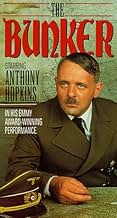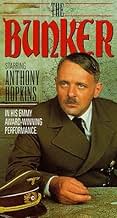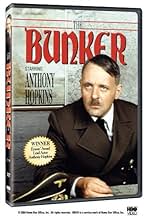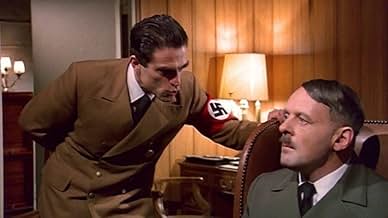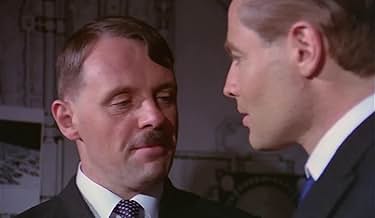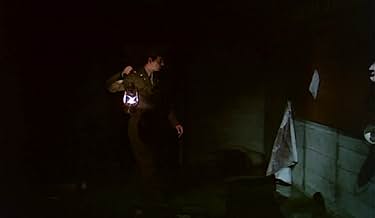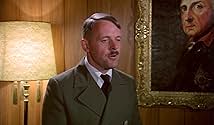The Bunker
- TV Movie
- 1981
- 2h 30m
IMDb RATING
6.8/10
2.8K
YOUR RATING
Dramatization depicting the events surrounding Adolf Hitler's (Sir Anthony Hopkins) last weeks in and around his underground bunker in Berlin before and during the battle for the city.Dramatization depicting the events surrounding Adolf Hitler's (Sir Anthony Hopkins) last weeks in and around his underground bunker in Berlin before and during the battle for the city.Dramatization depicting the events surrounding Adolf Hitler's (Sir Anthony Hopkins) last weeks in and around his underground bunker in Berlin before and during the battle for the city.
- Director
- Writers
- Stars
- Won 1 Primetime Emmy
- 1 win & 2 nominations total
Georges Corraface
- Gard SS #1
- (as George Chorafas)
- Director
- Writers
- All cast & crew
- Production, box office & more at IMDbPro
Featured reviews
This is the true story of the infamous Nazi dictator with his historic downfall. The story of Hitler's last days in an underground bunker gives insight to his madness. Here in the midst of his lackeys the dictator played out the final act of his life . It's well played by Anthony Hopkins who won an Emmy prize for his excellent acting. Atmospheric cinematography and gloomy musical score by Brad Fievel. This television movie is finely written by prestigious scriptwriter John Gay and stunningly directed by George Schaeffer. Other adaptation about this historical character are : ¨Hitler(1962)¨ by Stuart Heisler with Richard Basehart, ¨Hitler : The last days(1973)¨ by Ennio De Concini with Alec Guinness and the best is ¨The Downfall¨ by Oliver Hischbiegel with Bruno Ganz.
The picture is correctly based on real events, adding more details , the deeds happened of the following manner : ¨Fuehererbunker¨(Leader's Bunker)is the subterranean headquarter below the Chancellery and its garden in Berlin where Hitler (Anthony Hopkins) spent his last days, from April 20 to 30, 1945. It was constructed during WW2 some 50 feet below the ground. It could be reached through the New Chancellery by descending a stairway from the butler's pantry. There were two levels, On the upper level was a dining passage separating six rooms on each side. At the end of the central passage a curved stair led down to Hitler's own deeper bunker. This area had seventeen rooms , all small, cramped , and uncomfortable : Hitler's suite of three rooms, a map room used for conferences, the dressing room and bedroom of Eva Braun(Susan Blakely), the bedroom of Dr Paul Joseph Goebbles(Cliff Gorman) and wife(Piper Laurie),the rooms of Dr Ludwig, lavatories and bathrooms, an emergency telephone exchange, a drawing room, guardroom, cloakroom and a dog bunker for Hitler's Alsatian bitch named Blondi, with her four puppies. Hitler spent hours before giant war maps, shifting colored pins about to locate units that no longer existed. By this time he was in a state of extreme nervous exhaustion : although only fifty-six, he moved as if he were prematurely senile. His health grew even worse the ministrations of his doctors(Frank Gatliff, Morris Perry). With the exception of Goebbles and Martin Bormann(Michael Londsdale), his secretaries and several others, his lieutenants began to desert him. He denounced Herrmann Goering(David King)for trying to usurp his leadership and Heimrich Himmler (Michael Sheard) for seeking to negotiate with the count Bernadotte and Allied. Albert Speer (Richard Jordan) his minister of Armaments and War Production , refused to carry out his orders for a scorched-earth policy. At last acknowledge defeat, the Fuehrer decided to leave the world in a gesture of Wagnerian self-immolation. In the early hours of April 29, 1945, he married Eva and immediately afterward dictated his last will and political testament, in which he justified his life and work. The next day he retreated into his suite and shot himself while Eva took poison to end her life. In accordance with his instructions, the bodies were dumped into a trough in the Chencellery garden,doused with gasoline and burned. From April 22 to May 1, 1945 , the following were present in the Bunker: Gen Keitel(John Paul), Gen. Hans Guderian(Brain Villa) , Col.Von Below(Julian fellows), Gen. Alfred Jodl(Steedman) , Major Gen. Rattenhuber(David Swift), Lieutenant Genen Fegelein (Terrence Hardiman), Dr. Ludwig Stumpfegger , among others.
The picture is correctly based on real events, adding more details , the deeds happened of the following manner : ¨Fuehererbunker¨(Leader's Bunker)is the subterranean headquarter below the Chancellery and its garden in Berlin where Hitler (Anthony Hopkins) spent his last days, from April 20 to 30, 1945. It was constructed during WW2 some 50 feet below the ground. It could be reached through the New Chancellery by descending a stairway from the butler's pantry. There were two levels, On the upper level was a dining passage separating six rooms on each side. At the end of the central passage a curved stair led down to Hitler's own deeper bunker. This area had seventeen rooms , all small, cramped , and uncomfortable : Hitler's suite of three rooms, a map room used for conferences, the dressing room and bedroom of Eva Braun(Susan Blakely), the bedroom of Dr Paul Joseph Goebbles(Cliff Gorman) and wife(Piper Laurie),the rooms of Dr Ludwig, lavatories and bathrooms, an emergency telephone exchange, a drawing room, guardroom, cloakroom and a dog bunker for Hitler's Alsatian bitch named Blondi, with her four puppies. Hitler spent hours before giant war maps, shifting colored pins about to locate units that no longer existed. By this time he was in a state of extreme nervous exhaustion : although only fifty-six, he moved as if he were prematurely senile. His health grew even worse the ministrations of his doctors(Frank Gatliff, Morris Perry). With the exception of Goebbles and Martin Bormann(Michael Londsdale), his secretaries and several others, his lieutenants began to desert him. He denounced Herrmann Goering(David King)for trying to usurp his leadership and Heimrich Himmler (Michael Sheard) for seeking to negotiate with the count Bernadotte and Allied. Albert Speer (Richard Jordan) his minister of Armaments and War Production , refused to carry out his orders for a scorched-earth policy. At last acknowledge defeat, the Fuehrer decided to leave the world in a gesture of Wagnerian self-immolation. In the early hours of April 29, 1945, he married Eva and immediately afterward dictated his last will and political testament, in which he justified his life and work. The next day he retreated into his suite and shot himself while Eva took poison to end her life. In accordance with his instructions, the bodies were dumped into a trough in the Chencellery garden,doused with gasoline and burned. From April 22 to May 1, 1945 , the following were present in the Bunker: Gen Keitel(John Paul), Gen. Hans Guderian(Brain Villa) , Col.Von Below(Julian fellows), Gen. Alfred Jodl(Steedman) , Major Gen. Rattenhuber(David Swift), Lieutenant Genen Fegelein (Terrence Hardiman), Dr. Ludwig Stumpfegger , among others.
A stunning portrayal by Hopkins. Unfortunately the other cast members (the male ones anyway) do not look enough like the ghastly originals (!) to be convincing. For example, Goebbels is well enough acted, as are they all, but he just does not have the cadaverous look of Dr. Joseph. The Reich architect Speer is portrayed as far too nice a man. He wasn't. The exception is Bormann. Michael Lonsdale is made to look a little like this detestable man. In bearing, size and demeanor Lonsdale captures the essence of Hitler's right hand man He kept in the background most of the time, but was nonetheless an extremely powerful figure in the Third Reich and his power comes over very well. A good script and well directed, this film is well worth watching, especially now that it is readily available, uncut, on DVD.
The Third Reich was a land of insanity from its very beginning. That insanity increased as time went on, and this movie offers a pretty good look at its last days, as Hitler and his entourage hole themselves up in a bunker underneath the Reich Chancellory and act as if they're actually accomplishing something, even as Germany is being systematically overrun by Allied armies.
Of most interest are the various performances and the manner in which the various personalities are portrayed. Anthony Hopkins' work as Adolf Hitler was very good - especially considering the difficulties involved in playing such a complex and controversial subject. I thought Hopkins nailed the emotional complexity of the man - deliberately hiding himself from the realities of the War, calmly sitting down to tea with his secretaries one minute, then launching into a deranged tirade against his generals the next, addicted to drugs administered by his personal physician. Those who did makeup for this also got Hopkins to look the part - well not perfectly, but pretty close. Where I thought Hopkins missed the mark a bit was in Hitler's physical state. Aside from some trembling, Hopkins' Hitler actually looked pretty healthy. Other actors have to be looked at as well though, because this movie isn't really about Hitler - it has more to do with how the various personalities involved interacted with Hitler.
Much of the movie revolved around Nazi architect Albert Speer. Richard Jordan handled the part well, although the portrayal of Speer was interesting - probably unavoidably so, since Speer was almost as complex a character as Hitler. In the movie, Speer comes across as basically a good guy, fighting against Hitler's insane plans. There's truth to that view, but it's too limited. Speer was a devoted disciple of Hitler, and his actions against Hitler began only when it became obvious that Germany would lose the war. For Speer, as long as Germany might win, the horrors of Nazism seemed acceptable. Something was lacking in Cliff Gorman's portrayal of Joseph Goebbels. A lot was right - the portrayal of Goebbels' fanatical devotion to Hitler and Nazism, his rabid anti-semitism and his cold as ice attitude - to the point of killing his own family without a second thought simply because he felt that without Hitler, there was no reason for any of them to live. Still, something about Gorman as Goebbels didn't work for me. He just didn't look the part, and I could never really equate the voice with Goebbels either. The third figure of significance was Martin Bormann, portrayed by Michael Lonsdale. Lonsdale was good here. Bormann was a rather shadowy character, and Lonsdale portrayed him that way. You could never really be sure what Bormann's priority was here - getting out of the bunker or staying loyal to Hitler. In fact, that's accurate, because above everything else, Bormann's main preoccupation was with power - whether represented by Hitler or someone else.
Largely missing from this account of these last days in the bunker (although it does pop up in the end) is the rather morbid and completely unreal question of who would succeed Hitler - as if there was going to be anything to succeed to. As I understand it, that was a rather serious issue in the bunker in those last days and weeks; it gets largely passed over in this movie. Basically, however, this is very well done. I particularly liked the last scene, when the machinist Hentschel (Martin Jarvis) throws papers in disgust at the radio when it announces Hitler's heroic death, "fighting to the last breath against Bolshevism," when Hentschel knew full well that Hitler had cowardly committed suicide and left everyone else to fend for themselves. Overall, I give this a 7/10
Of most interest are the various performances and the manner in which the various personalities are portrayed. Anthony Hopkins' work as Adolf Hitler was very good - especially considering the difficulties involved in playing such a complex and controversial subject. I thought Hopkins nailed the emotional complexity of the man - deliberately hiding himself from the realities of the War, calmly sitting down to tea with his secretaries one minute, then launching into a deranged tirade against his generals the next, addicted to drugs administered by his personal physician. Those who did makeup for this also got Hopkins to look the part - well not perfectly, but pretty close. Where I thought Hopkins missed the mark a bit was in Hitler's physical state. Aside from some trembling, Hopkins' Hitler actually looked pretty healthy. Other actors have to be looked at as well though, because this movie isn't really about Hitler - it has more to do with how the various personalities involved interacted with Hitler.
Much of the movie revolved around Nazi architect Albert Speer. Richard Jordan handled the part well, although the portrayal of Speer was interesting - probably unavoidably so, since Speer was almost as complex a character as Hitler. In the movie, Speer comes across as basically a good guy, fighting against Hitler's insane plans. There's truth to that view, but it's too limited. Speer was a devoted disciple of Hitler, and his actions against Hitler began only when it became obvious that Germany would lose the war. For Speer, as long as Germany might win, the horrors of Nazism seemed acceptable. Something was lacking in Cliff Gorman's portrayal of Joseph Goebbels. A lot was right - the portrayal of Goebbels' fanatical devotion to Hitler and Nazism, his rabid anti-semitism and his cold as ice attitude - to the point of killing his own family without a second thought simply because he felt that without Hitler, there was no reason for any of them to live. Still, something about Gorman as Goebbels didn't work for me. He just didn't look the part, and I could never really equate the voice with Goebbels either. The third figure of significance was Martin Bormann, portrayed by Michael Lonsdale. Lonsdale was good here. Bormann was a rather shadowy character, and Lonsdale portrayed him that way. You could never really be sure what Bormann's priority was here - getting out of the bunker or staying loyal to Hitler. In fact, that's accurate, because above everything else, Bormann's main preoccupation was with power - whether represented by Hitler or someone else.
Largely missing from this account of these last days in the bunker (although it does pop up in the end) is the rather morbid and completely unreal question of who would succeed Hitler - as if there was going to be anything to succeed to. As I understand it, that was a rather serious issue in the bunker in those last days and weeks; it gets largely passed over in this movie. Basically, however, this is very well done. I particularly liked the last scene, when the machinist Hentschel (Martin Jarvis) throws papers in disgust at the radio when it announces Hitler's heroic death, "fighting to the last breath against Bolshevism," when Hentschel knew full well that Hitler had cowardly committed suicide and left everyone else to fend for themselves. Overall, I give this a 7/10
What a cast. And what a splendid job they all do in this description of Hitler's last days in the fortified bunker far beneath the Chancellery as World War II was closing in all around the Führer and the remains of his staff. And not one of the actors tries to fake a German accent.
Anthony Hopkins gives the finest portrayal of a living dead man that I've seen. There have been numerous other version, documentary and fictionalized, and some are fine productions but they don't achieve parity. Alec Guiness, for instance, gave us a Hitler who was annoyed by the disintegration of his armies and his plans, an exasperated leader who acts as if the automobile he's just bought is a lemon and not covered by a warantee. Luther Adler showed us a bitter madman. But Hopkins is modulated, quiet, quietly disturbed, his right hand trembling after the attempt on his life the year before. Hopkins' Hitler can no longer raise his injured right arm high enough to give the full salute. It's a stunningly precise and believable portrait. Suspicious, but not a raging paranoid. And under stress he lets loose a startling hiss. It's not surprising that Hopkins does such a good job in the role. He was my co-star in the superior "Road to Wellville" and I gave him a few pointers that helped him over the rough spots. He seemed put out when I charged him ten cents for the tutoring.
The central conflict here is between Hopkins and Albert Speer, his Minister of Arms and War Production. Speer was a brilliant architect and industrialist, a relatively young handsome officer played here by Richard Jordan. Hitler was fond of Speer, considering both of them -- the architect and the erstwhile painter -- to be artists. But now Hitler has issued orders that all of Germany be destroyed before the Allies get to Berlin. Speer objects. Hitler is adamant. Speer develops a plan to introduce poison gas into the vent that supplies air to the underground bunker, which will kill everyone inside, including Hitler. But after the last assassination attempt, Hitler has become double wary and self protective. The plan is dropped and Speer remarks that he'll not try another because "I think I only had one in me." Speer decides instead to agree to the destruction of Germany but will prevent it by bureaucratic stalling and by wrapping the process in red tape.
There are scenes between Hopkins and Jordan that are truly touching. Speer was perhaps Hitler's favorite among his staff. "My good architect; my GENIUS architect." Now Speer is telling him frankly that the war is lost. Well, nobody else is telling der Fürher that the war is lost. They know better, because the penalty for acting on that belief is death. But Hopkins BEGS Jordan for some sign of faith. Okay, Jordan believes the war is lost. But does he have faith in ME? Does he at least have HOPE? "Even THAT would satisfy me." Jordan is desolate and Hopkins is near tears as he implores his friend to give some positive response. It's like watching the tragic breakup of a love affair or a marriage. It seems impossible but Hopkins brings humanity to the most inhumane human being of his century. I can imagine the outcries against a portrait of Hitler that isn't a stereotype.
To make matters worse, we see him flirting with Susan Blakely as his mistress, Eva Braun. But if the viewer needs the usual clichés, they're available in occasional dissolves followed by flashbacks to better times, when Hitler and Speer first met, before Germany became a sewer, before the death factories began to churn out their product. But history is inexorable. As Berlin is encircled, desperate attempts are made to get out, to avoid the vengeful Russians by surrendering to Eisenhower in the west. The atmosphere in the littered and unguarded bunker itself follows secretary Traudl Junge's description -- the men on the remaining staff dance and carouse with the women and drink themselves into a stupor. It was a big party. The party atmosphere was enhanced by the mockery of a marriage between Hitler and Eva Braun. "Do you swear that you are of pure Aryan descent and free of hereditary diseases?" It's impossible not to be moved as the end approaches and Josef Goebbels invites his staff to a farewell party. The camera lingers on the faces of his children, some barely old enough to sing the heroic song, and all of whom he and his wife Magda will shortly kill by cyanide poisoning.
There have been a number of films about Hitler's last days, both feature films and documentaries. This is one of the best. Let's hope it's also the last. Who wants to watch a long, slow suicide?
Anthony Hopkins gives the finest portrayal of a living dead man that I've seen. There have been numerous other version, documentary and fictionalized, and some are fine productions but they don't achieve parity. Alec Guiness, for instance, gave us a Hitler who was annoyed by the disintegration of his armies and his plans, an exasperated leader who acts as if the automobile he's just bought is a lemon and not covered by a warantee. Luther Adler showed us a bitter madman. But Hopkins is modulated, quiet, quietly disturbed, his right hand trembling after the attempt on his life the year before. Hopkins' Hitler can no longer raise his injured right arm high enough to give the full salute. It's a stunningly precise and believable portrait. Suspicious, but not a raging paranoid. And under stress he lets loose a startling hiss. It's not surprising that Hopkins does such a good job in the role. He was my co-star in the superior "Road to Wellville" and I gave him a few pointers that helped him over the rough spots. He seemed put out when I charged him ten cents for the tutoring.
The central conflict here is between Hopkins and Albert Speer, his Minister of Arms and War Production. Speer was a brilliant architect and industrialist, a relatively young handsome officer played here by Richard Jordan. Hitler was fond of Speer, considering both of them -- the architect and the erstwhile painter -- to be artists. But now Hitler has issued orders that all of Germany be destroyed before the Allies get to Berlin. Speer objects. Hitler is adamant. Speer develops a plan to introduce poison gas into the vent that supplies air to the underground bunker, which will kill everyone inside, including Hitler. But after the last assassination attempt, Hitler has become double wary and self protective. The plan is dropped and Speer remarks that he'll not try another because "I think I only had one in me." Speer decides instead to agree to the destruction of Germany but will prevent it by bureaucratic stalling and by wrapping the process in red tape.
There are scenes between Hopkins and Jordan that are truly touching. Speer was perhaps Hitler's favorite among his staff. "My good architect; my GENIUS architect." Now Speer is telling him frankly that the war is lost. Well, nobody else is telling der Fürher that the war is lost. They know better, because the penalty for acting on that belief is death. But Hopkins BEGS Jordan for some sign of faith. Okay, Jordan believes the war is lost. But does he have faith in ME? Does he at least have HOPE? "Even THAT would satisfy me." Jordan is desolate and Hopkins is near tears as he implores his friend to give some positive response. It's like watching the tragic breakup of a love affair or a marriage. It seems impossible but Hopkins brings humanity to the most inhumane human being of his century. I can imagine the outcries against a portrait of Hitler that isn't a stereotype.
To make matters worse, we see him flirting with Susan Blakely as his mistress, Eva Braun. But if the viewer needs the usual clichés, they're available in occasional dissolves followed by flashbacks to better times, when Hitler and Speer first met, before Germany became a sewer, before the death factories began to churn out their product. But history is inexorable. As Berlin is encircled, desperate attempts are made to get out, to avoid the vengeful Russians by surrendering to Eisenhower in the west. The atmosphere in the littered and unguarded bunker itself follows secretary Traudl Junge's description -- the men on the remaining staff dance and carouse with the women and drink themselves into a stupor. It was a big party. The party atmosphere was enhanced by the mockery of a marriage between Hitler and Eva Braun. "Do you swear that you are of pure Aryan descent and free of hereditary diseases?" It's impossible not to be moved as the end approaches and Josef Goebbels invites his staff to a farewell party. The camera lingers on the faces of his children, some barely old enough to sing the heroic song, and all of whom he and his wife Magda will shortly kill by cyanide poisoning.
There have been a number of films about Hitler's last days, both feature films and documentaries. This is one of the best. Let's hope it's also the last. Who wants to watch a long, slow suicide?
Unless you understand the psychological make up of the German People and can clearly understand the German language it is hard to understand the absolute Charisma of Adolph Hitler or how the Third Reich came into being. This made for TV documentary is very accurate in its depictions, taken from interviews of an American officer over many years with the survivors of the events portrayed. The film chronicles the last 105 days of the life of Hitler and his inner circle from the moment he descends to the bunker in January 1945 until his death on April 30th of that year. Between the make-up and the acting of Anthony Hopkins you might well believe that Hitler was alive again, so compelling his performance. The late Richard Jordan gives one his finest performances as Reichsminister Albert Speer, Hitler's architect and later minister of munitions during the war. And to answer the carping critique of another commentator, everything I have read in history, which as it is my college major, is considerable, points to Speer's becoming a voice of reason and having a change of heart about the German Empire toward the end of the war. What was undeniable is the fact that those closest to him remained fanatically loyal, for the most part, some of them even pot the time that this film was made.
Two other outstanding performances were Michael Lonsdale (Moonraker) as Martin Borman and Piper Laurie as Magda Geobels, wife of Hitler's propaganda minister. She did kill her six children (or was it 7, I lost count) before dying with her husband in a suicide pact at the bunker. Whatever your feelings about Hitler, this film is a definite must see.
Two other outstanding performances were Michael Lonsdale (Moonraker) as Martin Borman and Piper Laurie as Magda Geobels, wife of Hitler's propaganda minister. She did kill her six children (or was it 7, I lost count) before dying with her husband in a suicide pact at the bunker. Whatever your feelings about Hitler, this film is a definite must see.
Did you know
- TriviaAfter viewing the dailies, one of the producers complained that Anthony Hopkins' portrayal of Adolf Hitler was too sympathetic. Hopkins replied that his portrayal was based on the premise that ultimately even Hitler was also human, and that's what's so horrific about him.
- GoofsAt the very end of the movie, the SS man/switchboard operator, Misch is seen talking to mechanic Hentschel while preparing to flee "The Bunker". The rifle Misch has shouldered is a Russian Mosin Nagant; he would have been carrying the German Mauser of which plenty would have been available with all the wounded in the proximity. It's unlikely anyone would have taken a Russian weapon down into Hitler's Bunker.
- Quotes
Albert Speer: The war is lost.
Adolf Hitler: [shouting] The war is not lost! The war is not lost! The war will never be lost! We're gonna beat'em, we're gonna beat'em all!
- ConnectionsFeatured in The 33rd Annual Primetime Emmy Awards (1981)
Details
Contribute to this page
Suggest an edit or add missing content

